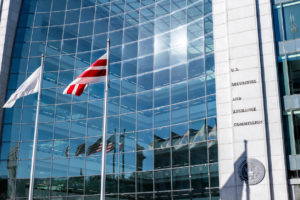Buried in the $740.5 billion National Defense Authorization Act for 2021[1] (“NDAA”) are numerous provisions that affect financial services law. Although the news media directed most of their coverage to Congress’s override of President Trump’s veto of the massive bill[2], this article discusses a few of the provisions that should be of interest to the financial services bar.
Disgorgement Authority
Of major significance is a provision that enhances the Securities and Exchange Commission’s (“SEC”) authority to seek disgorgement remedies in conjunction with an enforcement action.[3] The provision addresses a limitation on the SEC’s authority to seek equitable remedies against bad actors. In Kokesh v. SEC, the U.S. Supreme Court held that the five-year statute of limitations in 28 USC § 2462 applies when the SEC seeks disgorgement from those who have wrongfully enriched themselves. The court held that “disgorgement, as it is applied in SEC enforcement proceedings, operates as a penalty under § 2462. Accordingly, any claim for disgorgement in an SEC enforcement action must be commenced within five years of the date the claim accrued.”[4] In testimony before the U.S. Senate Committee on Banking, Housing, and Urban Affairs, SEC Chairman Jay Clayton asserted that the Kokesh decision has had the
anomalous effect of allowing the most “successful” perpetrators of fraud—those whose frauds are well-concealed and stretch beyond the five-year limitations period—to keep their ill-gotten gains. Since Kokesh was decided, an estimated $1.1 billion in ill-gotten gains has been unavailable for possible distribution to harmed investors, much of which is tied to losses by investors.[5]
Chairman Clayton further noted:
I greatly appreciate the bipartisan, bicameral work underway to address this issue, and I welcome the opportunity to continue to work with Congress to ensure the Commission is able to seek recoveries in cases of well-concealed, long-running frauds so that defrauded retail investors can get their investment dollars back while remaining true to the principles embedded in statutes of limitations.[6]
Apparently, those efforts bore fruit in the NDAA. The legislation amends Section 21(d) of the Securities Exchange Act of 1934 (“Exchange Act”), granting the SEC the authority to seek disgorgement against the person who received “unjust enrichment.” Congress included a statute of limitations of ten years for equitable remedies in most instances. The statute of limitations “clock” does continue to run during any time that the bad actor is outside of the United States.
I have prepared a mark-up showing how Congress amended Section 21 of the Exchange Act (in “Hill-speak” a “Ramseyer”). I have struck through deletions and marked the legislative changes in italics. It appears below:
H.R. 6395
The “William M. (Mac) Thornberry National Defense Authorization Act for Fiscal Year 2021”
******
Amendments of Title LXV – Miscellaneous
******
SEC. 6501. INVESTIGATIONS AND PROSECUTION OF OFFENSES FOR VIOLATIONS OF THE SECURITIES LAWS
[Page 1238]
(a) IN GENERAL. —Section 21(d) of the Securities Exchange Act of 1934 (15 U.S.C. 78u(d)) is amended —
(3) CIVIL MONEY PENALTIES IN CIVIL ACTIONS.— AND AUTHORITY TO SEEK DISGORGEMENT
(A) AUTHORITY OF COMMISSION.—Whenever it shall appear to the Commission that any person has violated any provision of this title, the rules or regulations thereunder, or a cease and-desist order entered by the Commission pursuant to section 21C of this title, other than by committing a violation subject to a penalty pursuant to section 21A, the Commission may bring an action in a United States district court to seek, and the court shall have jurisdiction to impose, upon a proper showing, a civil penalty to be paid by the person who committed such violation. “jurisdiction to—
“(i) impose, upon a proper showing, a civil penalty to be paid by the person who committed such violation; and
“(ii) require disgorgement under paragraph (7) of any unjust enrichment by the person who received such unjust enrichment as a result of such violation.”
(B) AMOUNT OF PENALTY. —
(i) FIRST TIER. — The amount of the penalty a civil penalty imposed under subparagraph (A)(i) shall be determined by the court in light of the facts and circumstances. For each violation, the amount of the penalty shall not exceed the greater of (I) $5,000 for a natural person or $50,000 for any other person, or (II) the gross amount of pecuniary gain to such defendant as a result of the violation.
(ii) SECOND TIER. — Notwithstanding clause (i), the amount of penalty amount of a civil penalty imposed under subparagraph (A)(i) for each such violation shall not exceed the greater of (I) $50,000 for a natural person or $250,000 for any other person, or (II) the gross amount of pecuniary gain to such defendant as a result of the violation, if the violation described in subparagraph (A) involved fraud, deceit, manipulation, or deliberate or reckless disregard of a regulatory requirement.
(iii) THIRD TIER.—Notwithstanding clauses (i) and (ii), the amount of penalty for each such violation amount of a civil penalty imposed under subparagraph (A)(i) for each violation described in that subparagraph shall not exceed the greater of (I) $100,000 for a natural person or $500,000 for any other person, or (II) the gross amount of pecuniary gain to such defendant as a result of the violation, if— (aa) the violation described in subparagraph (A) involved fraud, deceit, manipulation, or deliberate or reckless disregard of a regulatory requirement; and (bb) such violation directly or indirectly resulted in substantial losses or created a significant risk of substantial losses to other persons.
(C) PROCEDURES FOR COLLECTION. — [No change.]
* * * * *
(D) SPECIAL PROVISIONS RELATING TO A VIOLATION OF A
CEASE-AND-DESIST ORDER. [No change.]
* * * * *
(4) PROHIBITION OF ATTORNEYS’ FEES PAID FROM COMMISSION DISGORGEMENT FUNDS.—Except as otherwise ordered by the court upon motion by the Commission, or, in the case of an administrative action, as otherwise ordered by the Commission, funds disgorged under paragraph (7) as the result of an action brought by the Commission in Federal court, or as a result of any Commission administrative action, shall not be distributed as payment for attorneys’ fees or expenses incurred by private parties seeking distribution of the disgorged funds.
(5) EQUITABLE RELIEF [No change.]
* * * * *
(6) AUTHORITY OF A COURT TO PROHIBIT PERSONS FROM PARTICIPATING IN AN OFFERING OF PENNY STOCK [No change.]
* * * * *
(7) DISGORGEMENT. — In any action or proceeding brought by the Commission under any provision of the securities laws, the Commission may seek, and any Federal court may order, disgorgement.
(8) LIMITATIONS PERIODS. —
(A) DISGORGEMENT. — The Commission may bring a claim for disgorgement under paragraph (7)—
(i) not later than 5 years after the latest date of the violation that gives rise to the action or proceeding in which the Commission seeks the claim occurs; or
(ii) not later than 10 years after the latest date of the violation that gives rise to the action or proceeding in which the Commission seeks the claim if the violation involves conduct that violates —
(I) section 10(b);
(II) section 17(a)(1) of the Securities Act of 1933 (15 U.S.C. 77q(a)(1));
(III) section 206(1) of the Investment Advisers Act of 1940 (15 U.S.C. 80b–6(1)); or
(IV) any other provision of the securities laws for which scienter must be established.
(B) EQUITABLE REMEDIES. —The Commission may seek a claim for any equitable remedy, including for an injunction or for a bar, suspension, or cease and desist order, not later than 10 years after the latest date on which a violation that gives rise to the claim occurs.
(C) CALCULATION. — For the purposes of calculating any limitations period under this paragraph with respect to an action or claim, any time in which the person against which the action or claim, as applicable, is brought is outside of the United States shall not count towards the accrual of that period.
(9) RULE OF CONSTRUCTION. — Nothing in paragraph (7) may be construed as altering any right that any private party may have to maintain a suit for a violation of this Act.”
*****
(b) APPLICABILITY— The amendments made by subsection (a) [i.e., of this amendment] shall apply with respect to any action or proceeding that is pending on, or commenced on or after, the date of enactment of this Act.[7]
Anti-Money Laundering Provisions
Protection of Algorithms
The NDAA includes a remarkable provision to protect the privacy of algorithms that financial institutions use for their anti-money laundering (“AML”) compliance programs. Division F of the NDAA includes many amendments to the Bank Secrecy Act (“BSA”), including provisions that expand the scope of the BSA to “value that substitutes for currency,”[8] presumably referring to cryptocurrency. Other provisions strengthen the Financial Crimes Enforcement Network (“FinCEN”) by establishing a FinCEN exchange to facilitate voluntary public-private sharing of information[9] and increase technical assistance for international cooperation.[10] This article does not attempt to discuss all of those provisions on a comprehensive basis. However, I will focus on one provision that may have implications beyond AML compliance, and will make a recommendation with respect to AML rules.
The NDAA amends the Bank Secrecy Act to protect the confidentiality of algorithms that financial institutions use for their AML efforts. Section 6209 amends 31 USC § 5318(o)(3) to provide that if a financial institution discloses to its regulator information about an algorithm that the institution uses in conjunction with its AML program, the regulator must not disclose that information to the public.
Hedge fund managers have had legitimate concerns about revealing the details of their trading algorithms to regulators for fear of public disclosure. Managers appreciate the need for regulatory oversight, but preferred that regulators look at actual trading patterns, rather than the algorithms, during examinations. Managers only wished to release information about the algorithms themselves after regulators have examined other, less proprietary data, but still have regulatory concerns.
This amendment to the Bank Secrecy Act protects the confidentiality of the algorithms that financial institutions use for AML purposes, i.e., a public purpose, rather than trading algorithms. Nonetheless, the provision demonstrates the sensitivity of algorithms and the need for confidentiality, at least in some settings.
Perhaps this amendment to the Bank Secrecy Act will validate hedge fund managers’ concerns about keeping their trading algorithms confidential unless regulators cannot reasonably discharge their oversight responsibility in any other way.
Recommendation to FinCEN
The author suggests that the Treasury Department and FinCEN should re-propose and adopt final AML rules for investment advisers. Remarkably, FinCEN has never adopted final rules subjecting investment advisers to AML requirements. Prior administrations have proposed rules, but never adopted them.
The FinCEN 2015 Proposal[11] reviewed the history of the proposal and I have summarized it below:
- On September 26, 2002, FinCEN proposed rules requiring that unregistered investment companies establish AML programs (“Proposed Unregistered Investment Companies Rule”).[12]
- On May 5, 2003, FinCEN proposed requiring that certain investment advisers establish AML programs (“First Proposed Investment Adviser Rule”).[13]
- In June 2007, FinCEN announced that it was reconsidering both the Proposed Unregistered Investment Companies Rule and the First Proposed Investment Adviser Rule, and subsequently withdrew them.[14]
- After Congress passed the Dodd Frank Act,[15] FinCEN decided to propose new AML rules for investment advisers. The proposal notes that the Dodd Frank Act required most investment advisers to be registered with the SEC. “Accordingly, FinCEN believes the two-pronged approach of the prior proposals is no longer necessary to address the money laundering and terrorist financing risks presented by SEC registered investment adviser clients and the unregistered investment companies that are managed by such advisers.”
Briefly, the proposal would have amended 31 CFR § 1010 to add a new subsection 100(nnn), defining an investment adviser as “[a]ny person who is registered or required to register with the SEC under section 203 of the Investment Advisers Act of 1940….” As a result, the proposal would have made such investment advisers subject to the AML requirements. Of course, the proposal included numerous other requirements.[16] For whatever reason, the Obama Administration never adopted a final rule requiring that investment advisers have AML rules.
On September 14, 2020, FinCEN published an advanced notice of rulemaking (“ANPRM”), seeking comments on ways to improve the current AML requirements. The proposal notes that “any such amendments would be expected to further clarify that such a program assesses and manages risk as informed by a financial institution’s risk assessment, including consideration of anti-money laundering priorities to be issued by FinCEN.”[17] The ANPRM does not include any reference to the 2015 Proposal. The Trump Administration did not otherwise pursue the issue of applying AML requirements to investment advisers.
In my view, the Biden Administration should re-propose rules subjecting investment advisers to AML rules. I cannot point to a specific regulatory failure to justify my suggestion. Nonetheless, I believe that it is time for FinCEN to adopt such requirements for the following reasons:
- Investment advisers, particularly hedge funds, have AML programs. It would be foolish indeed for any investment manager not to have a program and wittingly or unwittingly to take “dirty” money. Any manager that accepted tainted money would face extreme reputational risk and probably would violate other statutes, depending on the circumstances.
- In some circumstances, it may be wise to adopt rules in the absence of a crisis. As President Kennedy said, “the time to repair the roof is when the sun is shining.”[18] I suggest that FinCEN should propose and adopt new rules in an environment that would permit thoughtful consideration of a proposal and comments rather than hastily adopting ill-conceived rules in a crisis environment. The NRPRM noted above might inform such a proposal.
- FinCEN’s rules should reflect the existing course of business that investment managers have with other, regulated financial institutions. AML rules for investment managers should integrate with the existing regulatory framework.
- If FinCEN adopted AML rules that differ from existing practice, managers would have an opportunity to comply.
Thoughtful rules would help investment advisers do a better job of supporting the existing AML infrastructure. Establishing clear rules for investment advisers that complement existing rules and practices would benefit everyone.
© Stuart J. Kaswell 2021, who has granted permission to the ABA to publish this article in accordance with the ABA’s release, a copy of which is incorporated by reference. Stuart Kaswell is an experienced financial services lawyer. He has worked at the Securities and Exchange Commission, as securities counsel to the Committee on Energy and Commerce of the U.S. House of Representatives (when it had securities jurisdiction), and has been a partner at two law firms and general counsel of two financial trade associations.
[1] The William M. (Mac) Thornberry National Defense Authorization Act for Fiscal Year 2021, H.R. 6395, 116th Cong., 2d. Sess. (2021). The bill is 1,480 pages long.
[2] The House voted to override the veto on Dec. 28, 2020; the Senate voted to override on Jan. 1, 2021. See also WSJ, Jan. 1. 2021
[3] Section 6501 of the NDAA. See also A. Frankel, Congress hid a big gift to the SEC in defense spending bill awaiting Trump’s signature, Reuters, Dec. 23, 2020.
[4] 581 US ___ slip op. at 11 (2017).
[5] Testimony of the Honorable Jay Clayton, Dec. 10, 2019 at text accompanying footnote 76. The Supreme Court subsequently upheld the SEC’s authority to seek disgorgement “an antecedent question” that Kokesh left unanswered. Liu v. SEC, 591 US ____ (2020), at slip op. 1.
[6] Id at text accompanying note 81.
[7] Compared to Exchange Act version dated October 2, 2019 available on the SEC’s website at https://www.govinfo.gov/content/pkg/COMPS-1885/pdf/COMPS-1885.pdf,As amended Through P.L. 115-141, Enacted March 23, 2018.
[8] Section 6102(c) of the NDAA.
[9] Section 6103 of the NDAA.
[10] Section 6111 of the NDAA.
[11] Department of the Treasury, FinCEN, RIN 1506-AB10, August 24, 2015, 80 FR 52680 (Sept. 1, 2015).
[12] Anti-Money Laundering Programs for Unregistered Investment Companies, 67 FR 60617 (Sept. 26, 2002).
[13] Anti-Money Laundering Programs for Investment Advisers, 68 FR 23646 (May 5, 2003).
[14] Withdrawal of the Notice of Proposed Rulemaking; Anti-Money Laundering Programs for Unregistered Investment Companies, 73 FR 65569 (Nov. 4, 2008); and Withdrawal of the Notice of Proposed Rulemaking; Anti-Money Laundering Programs for Investment Advisers, 73 FR 65568 (Nov. 4, 2008).
[15] The Wall Street Reform and Consumer Protection Act (“Dodd Frank Act”), Public Law 111–203, 124, Stat. 1376 (2010).
[16] FinCEN, Department of the Treasury, RIN 1506-AB10, (Aug. 15, 2015); 80 FR 52680 (Sept. 1, 2015)
[17] Docket No. FinCEN-2020-0011, 85 FR 58023 (Sept. 17, 2020).
[18] President John F. Kennedy, Jan. 11 1962, State of the Union Address.









